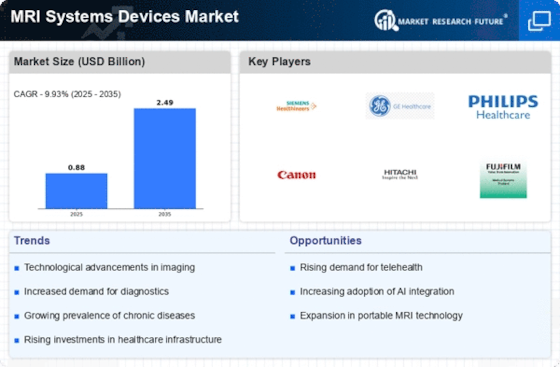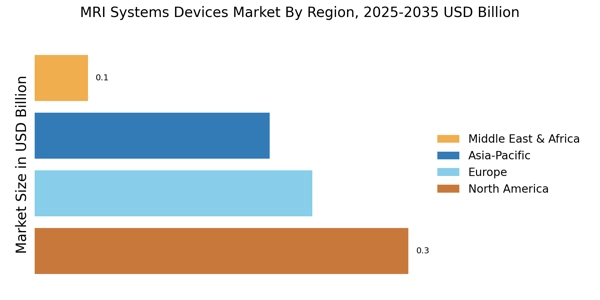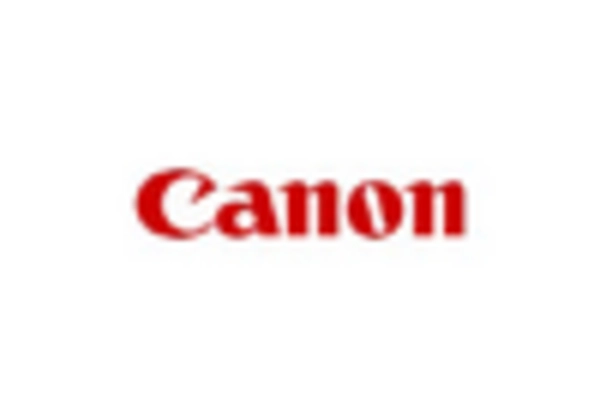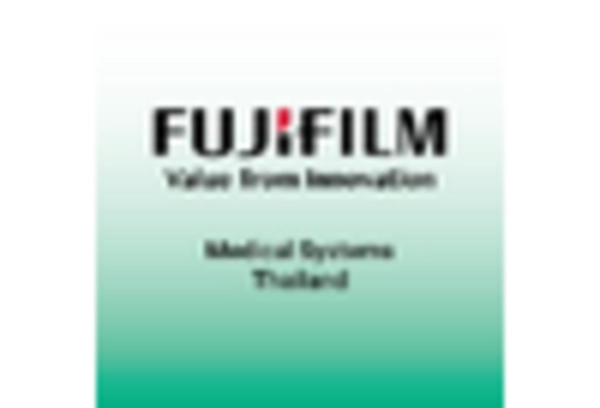Rising Healthcare Expenditure
The increase in healthcare expenditure across various regions is positively impacting the MRI Systems Devices Market. Governments and private sectors are investing more in healthcare infrastructure, which includes the acquisition of advanced medical imaging technologies. This trend is particularly evident in developing regions, where healthcare systems are evolving to meet the demands of modern medicine. Market analysis shows that healthcare spending is projected to rise by 7% annually, with a significant portion allocated to diagnostic imaging. As healthcare facilities upgrade their equipment to improve service delivery, the MRI Systems Devices Market is poised for growth, driven by increased investments in MRI technology.
Increased Demand for Early Diagnosis
The rising emphasis on early diagnosis in the healthcare sector is significantly influencing the MRI Systems Devices Market. As awareness of various diseases, particularly cancers and neurological disorders, increases, healthcare providers are prioritizing early detection methods. MRI systems are pivotal in this regard, offering non-invasive imaging solutions that facilitate timely interventions. Market data indicates that the demand for MRI systems is expected to rise, with a notable increase in utilization rates across hospitals and diagnostic centers. This trend not only enhances patient care but also propels the MRI Systems Devices Market forward, as more facilities invest in advanced MRI technologies to meet the growing demand.
Aging Population and Chronic Diseases
The aging population is a critical driver of the MRI Systems Devices Market. As individuals age, the prevalence of chronic diseases such as arthritis, cardiovascular conditions, and neurological disorders rises, necessitating advanced imaging techniques for diagnosis and management. MRI systems play a vital role in assessing these conditions, providing detailed images that aid in treatment planning. Data indicates that the population aged 65 and older is expected to double by 2050, leading to an increased demand for MRI services. This demographic shift is likely to propel the MRI Systems Devices Market, as healthcare providers adapt to the growing needs of an older patient population.
Expansion of Outpatient Imaging Centers
The proliferation of outpatient imaging centers is reshaping the MRI Systems Devices Market. These centers provide convenient access to diagnostic imaging services, catering to the increasing patient population seeking non-emergency imaging. The trend towards outpatient care is driven by the desire for cost-effective healthcare solutions and shorter wait times. As outpatient facilities expand, the demand for MRI systems is likely to increase, with many centers investing in state-of-the-art equipment to attract patients. Recent statistics suggest that outpatient imaging services are projected to grow at a rate of 6% annually, further solidifying the MRI Systems Devices Market's position in the healthcare landscape.
Technological Advancements in MRI Systems
The MRI Systems Devices Market is experiencing a surge in technological advancements that enhance imaging capabilities. Innovations such as 3T and 7T MRI systems provide higher resolution images, allowing for more accurate diagnoses. Furthermore, the integration of artificial intelligence in MRI technology is streamlining image analysis, reducing the time required for interpretation. According to recent data, the MRI market is projected to grow at a compound annual growth rate of approximately 5.5% from 2023 to 2030, driven by these advancements. As healthcare providers increasingly adopt these cutting-edge technologies, the MRI Systems Devices Market is likely to witness substantial growth, improving patient outcomes and operational efficiencies.

















